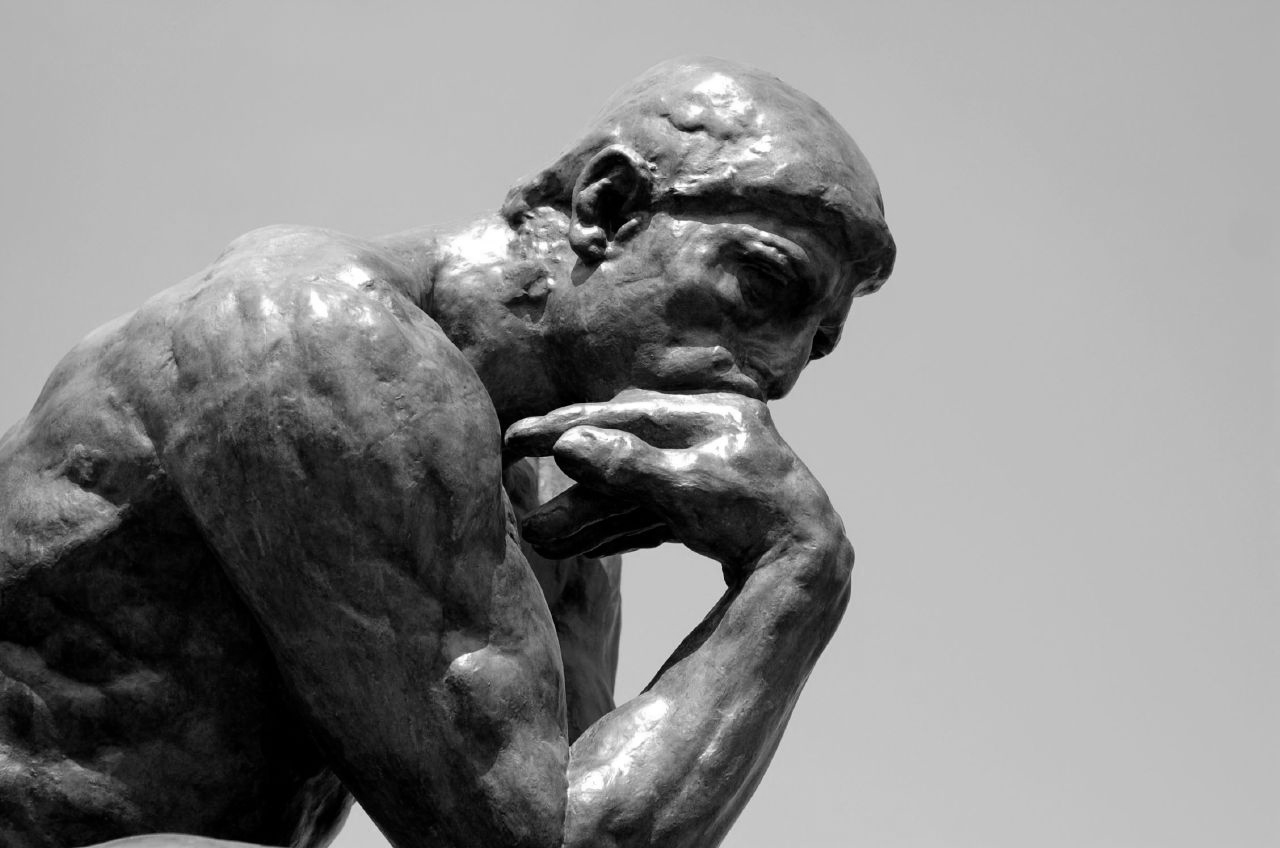Proof: Our Experience of Human Personhood
Photo credits: Unknown | CC0
Introduction
Our wondering about ourselves leads to very important insights. Personal experience — whether moral intuition, insights from logic, dependence on language and rationality, desires for beauty and goodness, or supernatural experiences — are absolutely important in the quest to know the truth about God and ultimate reality. But by themselves, they are, unfortunately, indeterminate. One’s own experience is limited and cannot establish what kind of story we live in, or whether good will triumph over evil, as in the Christian story. However, personal experience can corroborate or confirm the Christian story, as the resources below show.
Messages and Essays on Personal Experience
Athanasius as Evangelist: God Haunts and Calls Us Through Our Own Words
A blog post, Jan 22, 2018. A 10 minute read about how an early Christian leader, Athanasius of Alexandria (298 - 373 AD) recognized that language reaches into us; God uses words like “good and evil,” “beauty and ugliness,” “justice and injustice,” and so on, to remind us that there are larger moral categories into which we fit, and within which we are called to grow.
Weird Coincidences, Supernatural Events, Funny Feelings - Is That You God?
A message about experiencing unusual things, and how to interpret them as a good God directing our attention to Jesus.
Desires, Beliefs, and How We Know Truth: Why Do We Sometimes Not Desire Jesus?
A presentation about how human desire for life, beauty, goodness, love, and justice is suggestive but needs help, and how belief systems present ways of interpreting our desires and also theories of authentication.
Part 9: What’s the Right Thing to Do? And How Do We Know? looks at why and how Saruman tried to perform utilitarian calculations, while Gandalf received a morality from higher than himself. This episode explores why the heroes believed they needed to commit "folly." They knew they had to try to destroy the Ring. They knew they had to march on Mordor despite overwhelming odds. They knew they had to pity Gollum. The story shows us the big difference between a received (deontological) moral vision vs. a utilitarian calculation of ends and means.
Part 11: How Pagan Virtue Ethics Opens Up to Christian Faith, Hope, and Love shows how the noble pagan search for virtue ethics was a precursor to Christian love, hope, and faith. The Hobbits grow in love: from mere loyalty to the Shire to sacrificial love for all. Eowyn grows in hope: from hoping for a glorious death in battle to hoping that life and love will outlast death and violence. Finrod, and perhaps Andreth too, grow in faith: to believe that Eru must enter into Arda to heal the Marring.
This presentation is relevant to Proof: Love must relate to all humanity, not just our favorite humans, for what gives us the moral authority to limit a virtue like love? Hope of any sort must be founded on evidence. Faith must offer historical and not just literary data to be evaluated.
00:06:43 Pippin and Merry Grow in Love
00:27:00 Eowyn Grows in Hope
00:40:49 Finrod and Andreth Grow in Faith
01:27:40 How Do We Know?
The Anastasis Center blog post, Apr 28, 2016, on the Fall and the exile from the Garden. Neuroscientists currently observe that “karmic justice” or meritocratic-retributive justice is the default setting of the most primitive part of our brain. But restorative justice broadly works, even though it requires us to have empathy for even offenders and hope for personal repentance and change. Not only does this become a pastoral challenge, it is an argument against penal substitutionary atonement: It confirms that the fall produced an antipathy towards our fellow human beings that results in people making meritocratic-retributive justice the highest form of justice, even though restorative justice produces better results.
The Trinity: Can Other Gods Be Personally Known?
A presentation that observes that Jewish monotheism allowed for at least a binitarian God who was both transcendent and immanent at the same time. See also God’s Goodness: The Trinity to explore how God can be wholly good despite human evil.
Slides of a presentation given to the 2022 Reconstruction class. Video recording to the right. This material explores the biblical theme of human being and human becoming. God created us with good desires for more goodness and beauty, as well as the freedom to determine the direction of our love as constituting our human becoming. The biblical motif of meeting God on mountains is important. We glance at various Christian leaders, but do a deeper dive into Gregory of Nyssa’s Life of Moses, in his interpretation of Moses meeting God on Mount Sinai, and returning with shining face.
Other Resources on Interpreting the Experience of Human Personhood
C.S. Lewis, "Meditation in a Toolshed", the difference between "looking at" and "looking along"
C.S. Lewis, "The Weight of Glory," from his book The Weight of Glory and Other Addresses
C.S. Lewis, Mere Christianity, especially part one, reasoning from good and evil, and our experience of ourselves
Dallas Willard, Knowing Christ Today: Why We Can Trust Spiritual Knowledge, an excerpt
N.T. Wright, Simply Christian: Why Christianity Makes Sense. HarperOne | Amazon page, Feb 9, 2010.
Michael Polanyi, Personal Knowledge: Towards a Post-Critical Philosophy. University of Chicago Press | Amazon page, Aug 15, 1974. See also a summary of his Critical Realist Epistemology.
Perry C. Robinson, The Delusion of Experience. Energetic Procession blog, Jun 6, 2011.
John Gray, The Knowns and the Unknowns. The New Republic, Apr 20, 2012. A review of Jonathan Haidt's intuition model of morality
Tara Isabella Burton, Study Theology Even If You Don't Believe in God. The Atlantic, Oct 30, 2013.
We Don’t See Things As They Are, We See Them As We Are. Quote Investigator, Mar 9, 2014.
Reknew, Why Doesn't God Make Himself More Obvious? Reknew blog, May 23, 2014.
Robert Emmet Meagher, Killing from the Inside Out: Moral Injury and Just War. Cascade Books | Amazon page, Sep 15, 2014.
Sam Harris, The Self is an Illusion. Big Think, Sep 16, 2014. Harris argues that self-consciousness, the sense that we are a passenger in a vehicle, is an illusion and is reducible to biochemical processes
Reina A.E. Gattuso, Suck: Toward a Better Politics of Nakedness. Harvard Crimson, Oct 23, 2014. She wants a morality, which suggests that C.S. Lewis and the Genesis account are correct when they say that we know there is good and evil, and that we don't do the good but deploy objective language for our own ends.
Prayson Daniel, Kierkegaard: Subjectivity is Truth. blog, Jan 19, 2015.
Justin P. McBrayer, Why Our Children Don’t Think There Are Moral Facts. New York Times, Mar 2, 2015.
Lisa Miller, Why Kids Need Spirituality. New York Magazine, Apr 16, 2015.
Kevin Allen, Unique Characteristics of Eastern Orthodox Spirituality. Conciliar Post, Apr 16, 2015.
Matthew Becklo, The Argument from Johnny Cash. Word on Fire, Aug 24, 2015.
Robert Barron, Stephen Colbert, J.R.R. Tolkien, and the Providence of God. Word on Fire, Aug 25, 2015.
Amanda Gefter, Quantum Mechanics Is Putting Human Identity on Trial: If Our Particles Have No Identity, How Can We? Nautilus, Nov 19, 2015.
Robert Epstein, The Empty Brain. Aeon, May 18, 2016. The brain does not process information, retrieve knowledge or store memories; it is not a computer; encounters are irreducibly personal.
Hank Green, Batman and Identity: Crash Course Philosophy #18. Crash Course, Jun 20, 2016. An interesting presentation on identity.
Hank Green, Personal Identity: Crash Course Philosophy #19. Crash Course, Jun 27, 2016.
Hank Green, Arguments Against Personal Identity: Crash Course Philosophy #20. Crash Course, Jul 11, 2016. On David Hume's philosophy.
Babylon Bee, I Will Gladly Believe In God If You’ll Just Show Me Evidence His Opinions Are Identical To Mine. Babylon Bee, Jul 15, 2016. A funny satirical piece
John Oliver, The Republican National Convention. Last Week Tonight, Jul 24, 2016. About feelings vs. facts.
David Skeel, True Paradox: How Christianity Makes Sense of Our Complex World. InterVarsity Press | Amazon page, Aug 2014. “How do we explain human consciousness? Where do we get our sense of beauty? Why do we recoil at suffering? Why do we have moral codes that none of us can meet? Why do we yearn for justice, yet seem incapable of establishing it? Any philosophy or worldview must make sense of the world as we actually experience it. We need to explain how we can discern qualities such as beauty and evil and account for our practices of morality and law.”
Hank Green, Family Obligations: Crash Course Philosophy #43. Crash Course, Jan 23, 2017. A fascinating, short video on different views of obligation towards our parents; raises the question of moral intuition, whether there is an objective relational vision, and cultural and personal views
David Ernst, Donald Trump Is The First President To Turn Postmodernism Against Itself. The Federalist, Jan 23, 2017.
David Roberts, Donald Trump and the Rise of Tribal Epistemology. Vox, May 19, 2017.
Kurt Anderson, How America Lost Its Mind. The Atlantic, Sep 2017. Argues the 1960's and the internet make us vulnerable to fact-free reasoning.
Michael Eric Dyson, Ta-Nehisi Coates on Education, Religion, and Obama. Washington Post, Oct 13, 2017. Notes that Coates comes close to an exploration of faith:
“I don't know how you grow up black in this country and not have tremendous respect for the church, even though I was raised outside of it. So even as I articulate my beliefs, I try to be really respectful. I'm happy that it's received. I often wonder what is the place where the two things cross? Am I drawing some sort of conclusion, or some sort of feeling, that folks get in church anyway, regardless of their belief in Jesus Christ as their savior? Is there a route that they're traveling in their religion that leads to a similar place that I go, even with my lack of religion?
Q: That's right. Is it a more spiritual, or an intellectual, or even a moral kind of feeling? Because [James] Baldwin is post-religious in a significant fashion, yet deeply moral and spiritual — and the King James Bible keeps bubbling and eddying in his own language.
A: I often wonder what I am saying. But I guess there is something in my work that sounds, to a lot of people, like what they hear in church. And I just don't mean the fact of politics being discussed in church. But there's something else. And I don't really have the capability to analyze that.” (italics mine)
Rachel Aviv, How a Young Woman Lost Her Identity. The New Yorker, Mar 26, 2018. A tragic case of disassociative fugue, a disorder of temporary amnesia; raises important questions about the nature of personhood and the continuity of the person.
David Bentley Hart, Science and Theology: Where the Consonance Really Lies. Renovatio, Journal of Zaytuna College, Jun 5, 2018. DBH considers especially the notion that human free will does not exist, and argues from both scientific and philosophical standpoints that this theory rests on reductive physicalism. Quantum indeterminacy, which Hart regards as insufficient in itself for human free will, allows for at least some randomness. More serious is the organism-level focus by mathematical biologist Denis Noble, Dance to the Tune of Life: Biological Relativity (Amazon book, Jun 2017), who argues that the organism itself cannot be reduced to constituent parts, and still less its atomic and subatomic particles. Hart also argues that mind cannot be reduced to physical matter or energy.
Stephen Colbert, The 69 Year Old Man Who Identifies As 49. The Late Show, Nov 10, 2018.
Carol Kuruvilla, Stephen Colbert On How He Returned To Catholicism After Being An Atheist. Huffington Post, Nov 16, 2018.
Erica Trickey, Has Boston Given Up on God? Boston Magazine, Dec 11, 2018.
Christian List, Why Free Will Is Real. Harvard University Press, May 2019. See short article by Christian List, Science Hasn’t Refuted Free Will. Boston Review, Jan 28, 2020. Not by quantum indeterminacies, but because larger systems and organisms can behave in ways that are non-deterministically. Weather patterns, for example, have this emergent indeterministic property, observed by statistical mechanics.
Daniel Callicut, The Philosophical Problem with Our Pursuit of “Authenticity”. Prospect, Jun 18, 2019.
Peter Mommsen, The McDonald's Test: Learning to Love Back Row America. Plough, Jul 3, 2019. Chris Arnade says, “I was certainly an atheist when I began; it’s more complicated now… There aren’t many success stories in my book – there’s almost nobody who got out of a negative lifestyle. The only people who succeeded did it through faith – through the church. And so I had at first a grudging respect, and then a full-blown respect for what churches are doing.”
Sahanika Ratnayake, The Problem of Mindfulness. Aeon, Jul 25, 2019. “Mindfulness promotes itself as value-neutral but it is loaded with (troubling) assumptions about the self and the cosmos”
Richard Swinburne, Are We Bodies or Souls? Oxford University Press | Amazon page, Oct 2019. See also News, Oxford Philosopher: Without a Soul, There is No Self. Mind Matters AI, Oct 14, 2019.
Andrew Hasse, A 97-Year-Old Philosopher Ponders Life and Death: 'What Is the Point?' The Atlantic, Jan 14, 2020. “Death began to frighten him, and he couldn’t think himself out of it. Fingarette, who for 40 years taught philosophy at the University of California at Santa Barbara, had also written extensively on self-deception. Now, at 97, he wondered whether he’d been deceiving himself about the meaning of life and death.”
John Milbank, Life, Risk, and Covid-19. Institute for Art and Ideas, Apr 2, 2020. “Rejecting Heidegger’s nihilism” “Energy and life are, as it were, predatory ‘viruses’ that nonetheless somehow antedate and survive their hosts, whose new arrival is, in consequence, never-ending. Ultimately then, the ceaseless dissolution of individual things, including death (for which biologists cannot clearly find a ‘cause’), is as much a mystery as their original formation. This is why the speculation of the Church Father Gregory of Nyssa, taken up again by the Irish philosopher John Scotus Eriugena in the tenth century, concerning the plausibility of universal resurrection (extending, for Eriugena, beyond human beings to everything) is by no means absurd. Since we do not exactly know what ‘gluon’ (as Graham Priest puts it) holds any individual thing together – or why there are relatively integral ‘substances’ at all --we cannot dismiss the idea that all seemingly dispersed material elements remain ‘signed’ by this mysterious psychic unity, which could eschatologically reassert itself, beyond the current sway of time.”
Patrick McNamara, Neuroscience Disappears When the Complex Whole Is Decomposed. University of Notre Dame Church Life Journal, Oct 13, 2020.
N.T. Wright, Broken Signposts. Regent College, Nov 26, 2020. An 80 minute video where Wright summarizes his book of the same name. Wright explores human experiences of love, justice, beauty, etc. as limited but still meaningful signposts to Jesus.
Filup Molina and Tommy Bechtold, The Mandalorian Season 2, Episode 7 Reaction! (Chapter 15). The New Rockstars, Dec 11, 2020. Explores the question, “Are we sure we’re the good guys?” The Believer, the title of this episode, is the character Mayfield, who comes to believe that the Empire is not the same as the Republic, that not all forms of order are the same, which is what he believed before. Filup Molina and Tommy Bechtold do a great job exploring color, costume, etc. in the Star Wars universe to substantiate their point. The Believer is also Mando Din Djarin, who is coming to believe in another variation of the Way of the Mandalore, and the way of the Force. See also James Hunt, Who Is The Believer? The Mandalorian Season 2, Episode 7 Title Explained. Screen Rant, Dec 11, 2020. “The Mandalorian season 2, episode 7 is called "Chapter 15: The Believer," and the title applies to several characters in the installment.” This points to the personal investment we have to believe we are on the side of “the good guys” in the end. Something in us wants to believe it. That something, in Christian theology, is the image of God.
Father Stephen Freeman, The Mythic Character of Reality. Glory to God for All Things blog | Ancient Faith, Apr 19, 2021. “Professor Digory says it well: “It’s all in Plato, all in Plato; bless me, what do they teach them at these schools!” The early conversations between Lewis and Tolkien were not about Christ, per se. They were about myth and the character of reality.” Myth is not about human personhood per se, typically. But they highlight yearnings in our humanity, and often consider a role or part in the grand drama of history that we are meant to play.
Esther O’Reilly, Douglas Murray Wants Christianity to Stay Weird. Will It Help Him Believe Again? Patheos, May 25, 2021. Explores “Myth” and the human.
Nickel Rura, Spirituality Linked with Better Health Outcomes. Harvard Gazette, July 12, 2022.
Sabine Hossenfelder, Does Consciousness Influence Quantum Effects? Sabine Hossenfelder, Nov 19, 2022. Entertaining and brilliant.
Word on Fire, Tolkien, Lewis, and Evangelization. Word on Fire, Mar 23, 2023. A one hour panel discussion. This discussion is significant because of how C.S. Lewis, and J.R.R. Tolkien even more so, relied on the connection between virtue ethics and our moral imagination-intuition based on God’s creation of us in His image — we are haunted and drawn to God’s moral, relational, personal vision for human life. Thus, we are drawn to Christ.
The Living Philosophy, A Cure for Nihilism? | Everything Everywhere All At Once. The Living Philosophy, Mar 26, 2023. A 20 minute video. Waymond’s response to nihilism is love — not romantic love necessarily, but love in every relationship, especially the intergenerational relationship of mother Evelyn and daughter Joy.
Daniele Oriti, There Are No Physical Laws in the World. Essentia Foundation, Apr 16, 2023. Observation by human persons affect physical objects on the quantum level.
Richard Beck, The Incoherence of Post-Christian Morality. Experimental Theology | Substack, Mar 19, 2024. On the lack of moral absolutes and metanarrative, yet moralism and judgmentalism especially from “the progressive left.” Optimistically, this is evidence of the imago dei despite denials that we are God’s beloved creations with moral accountability. Pessimistically, this is evidence of postmoderns dressing up power relations as moral relations.
Proof: Topics:
This section on Proof spotlights Christian faith’s engagement with forms of knowing. Science by itself is supportive but indeterminate as a way of knowing the truth of Christian faith. Philosophy points to some kind of God, or first cause, without being able to go further. History is the primary mode of knowing about Jesus, much like a jury reasoning about the past to determine the proper narrative. Human Personhood highlights our experience of personhood, which corroborates the conclusions of historical investigation about Christian faith and a Christian understanding of human personhood.





